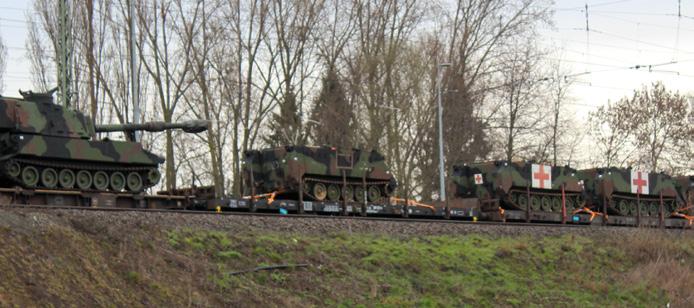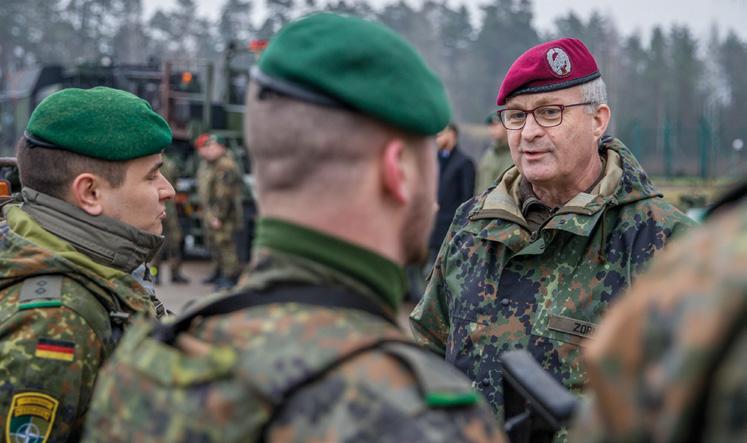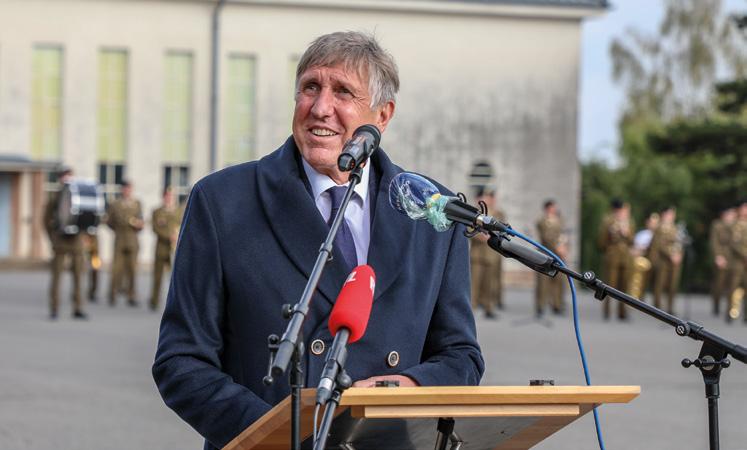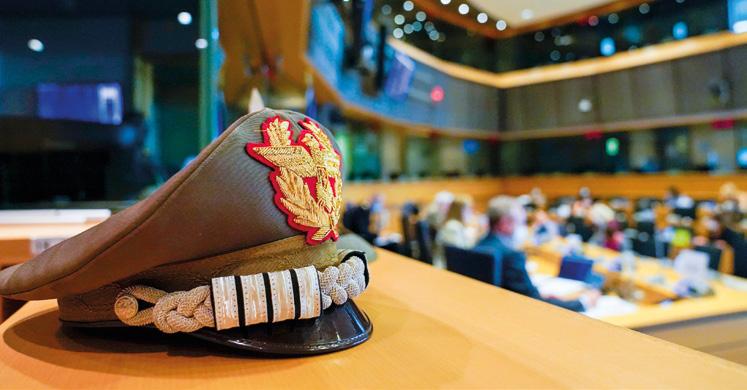
10 minute read
Interview with Cyrille Schott, Strasbourg “The critical mind is also free in its thinking about religions” Our freedom is an inalienable right
In the Spotlight +++ Terrorism +++
Our freedom is an inalienable right “The critical mind is also free in its thinking about religions”
Interview with Cyrille Schott, Préfet (h.) de région, Strasbourg suffering terrorist attacks since 2015. In November, society was struck with horror after the decapitation of a school teacher by a radical Islamist. Samuel Paty had explained to his pupils that freedom of expression and freedom of the press are essential marks of democracy, illustrating his ideas with the caricatures on Mohammad, which led to the brutal murders of satirical magazine Charlie Hebdo journalists by Islamists five years ago. How can a society stand firm against such a permanent threat in the long run? Cyrille Schott: Through Samuel Paty’s horrific murder, it is the schools of the French Republic that are attacked. These schools constitute the melting pot of the nation, through the knowledge and values transmitted to young people, particularly freedom of thought and expression. If France has been particularly badly struck, this terrorism threatens the whole of Europe, as the recent attacks in Dresden and Vienna have shown. The terrorist threat today comes less from organised groups, but can take shape anywhere, by isolated and easily influenced individuals, exceedingly difficult to identify before the act. This causes our fellow citizens a diffuse fear, amplified by the fears associated with the health crisis. However, we ought not to underestimate the resilience of our societies. Our democracies are much stronger than authoritarian regimes where public debate is excluded. What is important is that our societies remain united on the essential, the will to live together. Our countries, despite their imperfections, represent the greatest space of freedom, prosperity and social justice in the world. The European: President Emmanuel Macron held after this tragic event a rigorous speech on freedom of expression and democracy, underlining that caricatures and critiques on religions must be allowed. Was he right to give this speech which didn’t diffuse the situation, but was a strong sign that France will not give in to the pressure of radical Islamists? Cyrille Schott: The freedom to blaspheme is one of the freedoms recognised in France. It does not mean that you must blaspheme. Laïcité forms one of the foundational elements of
the French nation, which is not always well understood outside
The European: Mr Schott, your country, France, has been of France. It means that the state and religions are separate, which does not imply that the state ignores religions; it means that everyone has the freedom to believe or not to believe in God, and can freely practice his religion, as long as he does not disturb public peace. It means that the critical mind is also free in its thinking about religions. Caricatures are part of this freedom and more broadly of the freedom of the press. These elements exist in all European democracies and are not unique to France.
The European: What means could the European Union use to stop Islamists’ harmful actions? Cyrille Schott: First, we must fight terrorism with the utmost
rigour. The intelligence, security and justice services must get the legal, material and digital tools to fight; they must coordi-
nate closely. Recent meetings of European leaders are in line with this.
Secondly, we must prevent separatist discourses and encourage an Islam from Europe, instead of an Islam in Europe;
France and Germany announced measures in this sense. The
“We ought not to
difference is that Islamic theology can be studied in German universities, whereas in
France, laïcité requires that other structures
underestimate the resilience of our societies.”
be used, more difficult to create and control.
In its fundamentals, however, the approach is similar. The same goes for the training of imams in Europe, instead of bringing them from abroad. Finally, our leaders must act to
maintain, in speech and action, the unity of the national community. Fellow citizens of Muslim culture or religion are part of it. The vast majority aspire only to peacefully hold their place in our society. Economic and social policies must also be implemented to prevent people in certain neighbourhoods from being discriminated against, or foreigners who enter legally, particularly under the right to asylum, from having insufficient opportunities for integration.
The European: Mr Schott, can we agree on a common appeal to never sacrifice, out of fear or laxness, the smallest grain of our freedom to totalitarian Islamism? Cyrille Schott: Our freedom is an inalienable right. It cannot be
abandoned in the face of totalitarianism, whatever it may be!
→ See also Mr Schott’s article on security and defence (pp. 18-20)
The EU should leverage its economic and diplomatic power Ransomware is becoming a systemic threat to Europe’s economy
by Jean-Louis Gergorin, former Executive VP for Strategy of EADS, and Léo Isaac-Dognin, Director for Digital Trust, Capgemini Invent, Paris
Jean-Louis Gergorin and Léo Isaac-Dognin are co-authors of “Cyber, la guerre permanente” (2018, Editions du Cerf)
graphic: ©elenab, stock.adobe.com
Cybercrime entered a new chapter in 2020. What was once an emerging threat is now a full-blown risk to economic activity across the globe. Europe is a top target due to the combination of its considerable wealth and relatively high level of digitisation.
The pandemic has added fuel to the fire
Ransomware attacks, whereby hackers encrypt their target’s data and threaten to delete it unless a ransom is paid under short notice, have become the primary concern. Recent reports by agencies such as France’s ANSSI1 indicate that the number of incidents is projected to quadruple in 2020. The Covid-19 pandemic has added fuel to the fire: a climate of fear and uncertainty, in addition to the increased reliance on digital infrastructure, has made it easier than ever for hackers to trick victims into infecting their systems. Not to mention the widespread availability of packaged ransomware tools across the dark web, or what criminals and law enforcement now call a ‘malware-as-a-service’ model. Cybercriminals are becoming more confident, and they have every reason to. The average ransomware payment asked of SMEs has doubled in a year, now reaching over 6000 € per target. In the case of larger corporations, a single attack can bring in several million euros in the space of days to top cybercriminals.2 While the upside is high, operational costs are low and downside risks are limited. Criminals have little to lose: their attacks may be blocked, but there has yet to be significant consequences for most of them. If anything, criminals have been among the greatest beneficiaries of the digital revolution: they can attack thousands of targets at the click of a button, all while staying in the shadows. Cybercriminals have become indiscriminately in their attacks, targeting everything from large corporations to small suppliers, universities and public service providers, with a marked focus on healthcare facilities. Last May, Europe’s largest private hospital operator Fresenius, also a key provider of dialysis kits in high demand during Covid-19, was hit with a particularly sophisticated ransomware that significantly disrupted operations on a global scale.
The golden age of cyberpiracy
Taking into account both the costs of ransoms paid and the cost of IT downtime, security experts estimate that the total cost of ransomware in 2020 will range from $1.1 to 4.3 billion in Italy, $1 to 4 billion in Germany, and $830 million to 3.3 billion in Spain3. Existing data makes it difficult to obtain precise ranges, but even with conservative parameters, the economic and social costs are daunting. Such widescale activity cannot happen without certain forms of state passivity, and in some cases state sponsorship.
→ Continued on page 16
In the Spotlight +++ Cybersecurity +++
Private cybersecurity firms and law enforcement converge on the idea that the most significant ransomware threats, including Ryuk and Dridex, are run by criminal enterprises, with significant operations running out of non-European Union countries – Russophone countries in the case of the aforementioned malwares.4 The situation resembles the conditions that led to the “golden age” of piracy of the 16th century, where pirates blossomed across the Atlantic and were systematically instrumentalised, if not directly mandated by states like Britain, France or the Netherlands to weaken enemies, in particular Spain, the wealthiest power of the time. Three centuries ago, piracy ceased once global powers of the time decided it was hampering economic development. Today, Europe cannot become an area with security standards and policy that do not match its prosperity, where pirates feel that they roam and loot freely. European law enforcement agencies have made remarkable strides in moving online to tackle organised crime in the physical world, particularly drug and human trafficking, and to a lesser extent child pornography, but they need help in tackling ‘pure’ cybercrime. On 20th November, the UK formally confirmed it has set up a National Cyber Force that will work closely alongside intelligence agencies, most notably the Government Communications Headquarters (GCHQ), as a new unified command to tackle cyberthreats through offensive cyber-operations, including against criminals. EU Member States should take stock off this approach, both by considering all means to deprive cybercriminals of the sanctuaries constituted by countries not signatory to the Budapest Convention on Cybercrime, and by pursuing greater information sharing between cybersecurity agencies, intelligence, and key industrial partners.
Trade relations can be a powerful tool
EU leaders and policymakers also need to rise to the challenge. Individual travel bans and asset freezing, as recently enacted by the EU against Russia, China and North Korea-based actors already sanctioned by the US for cyberattacks dating back to 2017-2018,5 will not deter seasoned cybercriminals. Will Member States and EU institutions remain silent while businesses and critical infrastructure are attacked daily? The Union should leverage its economic strength and make known that trade relations with third party states will henceforth take account of their efforts to tackle cybercrime within their borders, linking trade terms to targets in cybercrime reduction, and helping states that do not have the means to tackle them independently. Western leaders must bring this topic to the table in their discussions with
Jean-Louis Gergorin
is the owner of JLG Strategy, an aerospace, defence and cyber consultancy, and teaches a course entitled “The new strategic upheaval” at Sciences Po Paris. He was previously inter alia
Photo: Julio Piatti
executive vice-president (strategy) of EADS (now Airbus) and head of policy planning of the French Foreign Ministry. An alumnus of Ecole Polytechnique, Ecole Nationale d’Administration and the Stanford Executive Program, he is co-founder of the French-American Cybersecurity Conference.
Léo Isaac-Dognin
is a director at Capgemini Invent’s Citizen Services practice in Paris, where he advises European public and private organisations on digital strategy, security and sovereignty. He holds a BA from
Photo: Hannah Assouline
the University of Cambridge and a joint MPA/MIA from Columbia University and Sciences Po Paris. He also lectures at Sciences Po Paris. Leo previously worked for the UK’s Financial Conduct Authority as a financial crime analyst and policy advisor.
global counterparts. The urgency and scale of the issue justifies that the Council appoint an EU Cybersecurity Coordinator to coordinate strategy, intelligence sharing, defence policy and align Member State positions on the matter. One decade ago, Europe took a strong stand in tackling piracy in the gulf of Aden, directly contributing to the drastic reduction of incidents in the region by setting up the EU NAVFOR mission in 2008, garnering the cooperation of partners such as the US, China and India, and working within the region to tackle the economic conditions that lead to piracy. Similar steps need to be taken to tackle cyberpiracy.
1 https://bit.ly/389sIaR 2 https://ibm.co/34nmAdV 3 https://bit.ly/37nz9YG 4 https://bit.ly/3gVfItf 5 https://bit.ly/3ntbnAa
MAIN TOPIC: Quo vadis Europe?
Will the European Union emerge stronger from the crisis and be willing and capable to take on more responsability for global security and peace in the future? How will the widely discussed Strategic Compass, initiated under the German EU Presidency, contribute to a clear concept of what European defence really means? And in which way could national forces be restructured to make them rapidly available for civilian but also military EU operations? The authors in this chapter give their view on these burning questions.










